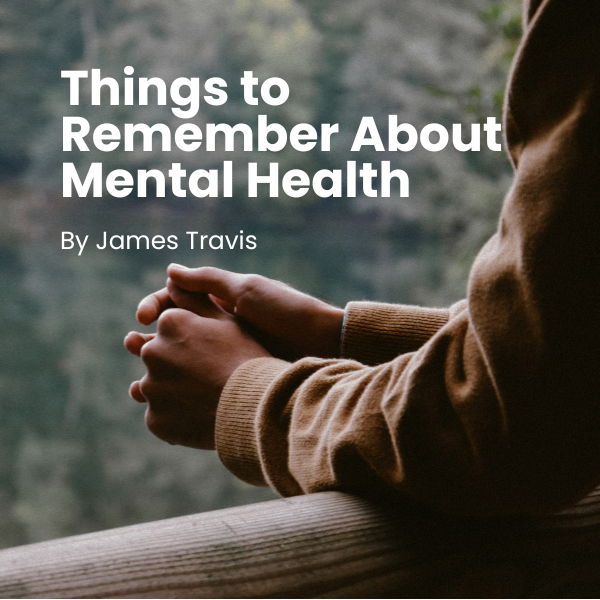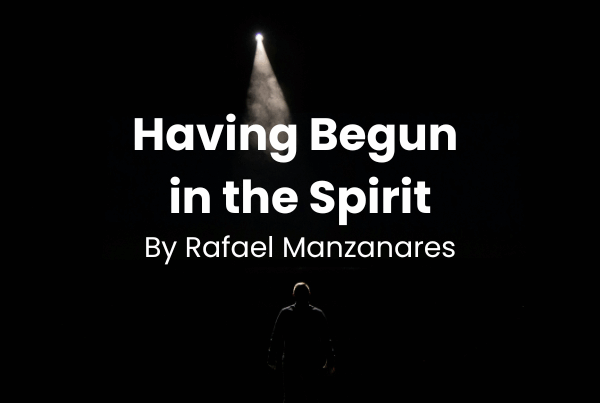
Today, the 10th of October, is World Mental Health Day.
A recent international study found the following:
“One out of every two people in the world will develop a mental health disorder in their lifetime…”
(Harvard.edu)
One out of every two means that as you read and I write, either you or I will experience mental health problems in our lifetimes (and, very possibly, both of us).
When people are physically ill, we cook for them, we pray for them, and we might even offer to go over to their home and clean. When a family has a baby and needs the support of a community, we make schedules to visit, take meals, and offer childcare for any older siblings. But, when there is a problem that begins in the mind, many do not know what to do. This is even true, sadly, within the church. Why is it, when our Bibles have so much to offer in terms of caring for others in a vast and varied range of situations, that this kind of struggle can find us lacking?
Here are some important things to remember:
The brain can get ill just like any other organ in the body; read Brains Get Sick Too by Rebecca Slack, PhD.
I recently learned the following:
“Just as diabetes has to do with a body’s failure to regulate blood sugar, mood disorders result from the brain’s failure to regulate the chemicals that control mood. Specifically, nerve cells in the brain communicate with each other by releasing chemicals called neurotransmitters. Norepinephrine and serotonin are the two neurotransmitters involved in depression. When there is an ample supply of these neurotransmitters available to stimulate other nerve cells, one typically feels “normal.” You can still have your regular ups and downs, but you aren’t fighting the illness of depression. But in clinical depression, fewer of these neurotransmitters are released because the first nerve cell reabsorbs them before they’ve adequately stimulated other nerve cells.”
Illness is illness, in whatever part of the body it is found. Neither visible or invisible illness were part of God’s plan for humanity and their presence reflects the fallen world we live in (Genesis 2.9, Revelation 22.1-4). Our frail and fallible bodies will one day be raised to newness of life and be without sickness of any kind (1 Corinthians 15.51-55) but until then, things will go wrong.
Mental (and physical) health problems are not rooted in sin.
Challenge this false assumption with John 9.1-3:
“Now as Jesus was passing by, he saw a man who had been blind from birth. His disciples asked him, “Rabbi, who committed the sin that caused him to be born blind, this man or his parents?” Jesus answered, “Neither this man nor his parents sinned, but he was born blind so that the acts of God may be revealed through what happens to him.”
I love what Edwin Blum wrote about those verses:
“The disciples faced a theological problem. Believing that sin directly caused all suffering, how could a person be born with a handicap?… [John 9.1-3) does not contradict the universal sinfulness of man (cf. Rom. 3:9-20, 23). Instead Jesus meant that this man’s blindness was not caused by some specific sin. Instead the problem existed so that … God could display His glory in the midst of seeming tragedy.”
(emphasis added)
It is ok to ask for help.
Physical struggles that need medical intervention are not looked down upon, neither is your mental health.
It is self-evident that when we are sick, we need a doctor to make us well (Jeremiah 8.22, Luke 5.31). Sometimes that doctor prescribes a cautious and minimal treatment plan, other times that doctor will offer a more definite intervention. We trust their judgement and never look down upon someone who leaves the hospital with medication.
We would never, ever think to chastise or criticise someone seeking an oncologist if they have cancer or someone visiting an orthopaedic surgeon if they have a broken leg. As we have said, the brain can malfunction just like any other organ, so, logically, there is no stigma attached to seeking treatment. Sometimes that will be cautious, sometimes more definite. Both are ok, and the fear of criticism for seeking help should not stop you doing so.
You are not alone.
There is likely someone in your life who knows exactly what you are going through.
“… within the Christian community, where openness and grace should flow the richest and deepest, where the masks are meant to come off and safety offered to all, owning depression [and other mental health struggles] is virtually taboo. There is an unwritten rule that people of faith should not be depressed. The prevailing idea is that the Christian faith is to be a faith of joy, making depression a sin, which means there is no excuse for a depressed spirit. As a result, depressed people have been riddled with guilt, have hidden in shame, and have been afraid to surface in order to get the help they need.”
(Church and Culture)
It might shock you to hear that giants of yesteryear — such as the great reformer and hymn writer Martin Luther, the prince of preachers and ever quotable Charles Spurgeon, and one of the best known missionaries of the nineteenth century Hudson Taylor — all suffered with what we would call depression today. We would never, ever think of criticising these men, their faith, or their impact on modern Christianity. It was, perhaps, even more courageous for them to admit difficulty in a time when, generally, difficulties were not admitted. We would never say that they were not a ‘strong enough believer’ because they struggled with issues that were not as visible as a broken leg or a cancerous growth.
All of that to say, there are people all around us who have experiential knowledge of what we are dealing with and would, I am sure, love to help you. Many of us, however, are not mind readers and do not want to seem like a nosey-Nigel by being overly full of questions, so if you would appreciate help, confide in someone you trust.
Beyond heroes of the faith and those in our lives now, the Psalmist records in Psalm 42:
“Why are you depressed, O my soul?
Why are you upset?
Wait for God!
For I will again give thanks
to my God for his saving intervention.
I am depressed,
so I will pray to you while in the region of the upper Jordan,
from Hermon, from Mount Mizar.”
(vv.5-6)
Depression, mental health struggles, openly talked about in the Bible?!
In his struggles, the Psalmist is met with, literally, overwhelming grace. God does not look down on those who come to Him with problems, and yes, that includes those that find their origin in our minds, thoughts, or emotions:
“One deep stream calls out to another at the sound of your waterfalls;
all your billows and waves overwhelm me.
By day the LORD decrees his loyal love,
and by night he gives me a song,
a prayer to the God of my life.”
(vv.7-8)
The Psalmist has taken his struggle to God (v.6) and has found grace, love, and care (vv.7-8). On this reception and provision, F.B. Meyer wrote the following:
“…whatever the depths of our sorrow, desire, or necessity, there are correspondences in God from which full supplies may be obtained.”
Conclusion
Stated as simply as possible: If this is how God treats those who come to Him with struggles that begin in our minds, thoughts, or emotions, should we not do all we can to do the same?
From this day forward, when someone we know takes the courageous step to voice their struggles, let us all treat them with the same grace with which the Lord so freely gives us (cf. Ephesians 4.32, 1 John 4.19).
Further Reading
The American Bible Society, Healing The Wounds Of Trauma: How The Church Can Help.
Bessel Van Der Kolk, M.D., The Body Keeps The Score.
Gaby Galvin, “The U.S. Suicide Rate Has Soared Since 1999,” U.S. News and World Report, April 8, 2020, read online.
Brianna Abbott, “U.S. Suicide Rates Rose in 2021 After Two Years of Decline,” The Wall Street Journal, September 30, 2022, read online.
Charles Swindoll, Growing Strong in the Seasons of Life.
Dwight L. Carlson, “Exposing the Myth that Christians Should Not Have Emotional Problems,” Christianity Today, February 9, 1998, read online.
Samuel H. Chao, “Remarkable or Little-Known Facts About Hudson Taylor and Missions to China,” Christian History15, no. 4.
Larry Crabb, Connecting: Healing Ourselves and Our Relationships.
https://hms.harvard.edu/news/half-worlds-population-will-experience-mental-health-disorder?_ga=2.240407427.1432749876.1728282009-550650552.1728282009#:~:text=Massive%20burden%20of%20disease,by%20the%20age%20of%2075.
https://theconversation.com/how-neuroscience-can-teach-children-about-mental-health-31713
https://www.churchandculture.org/blog/2022/10/10/suicide-and-the-church







